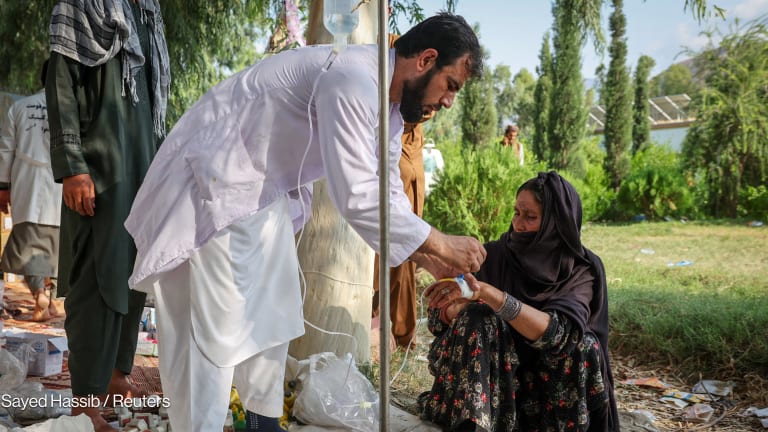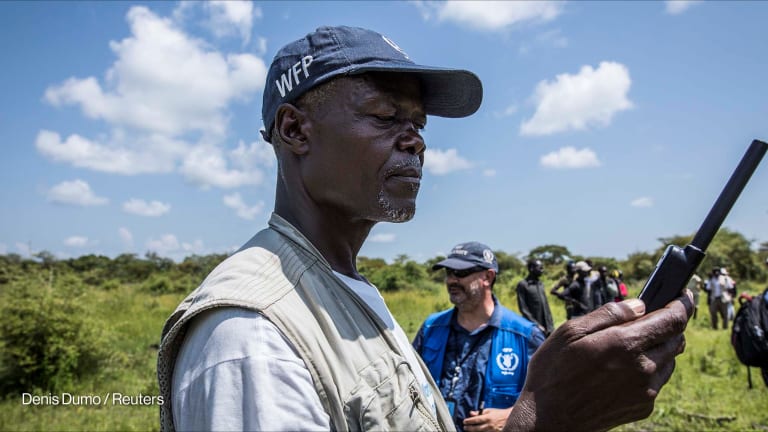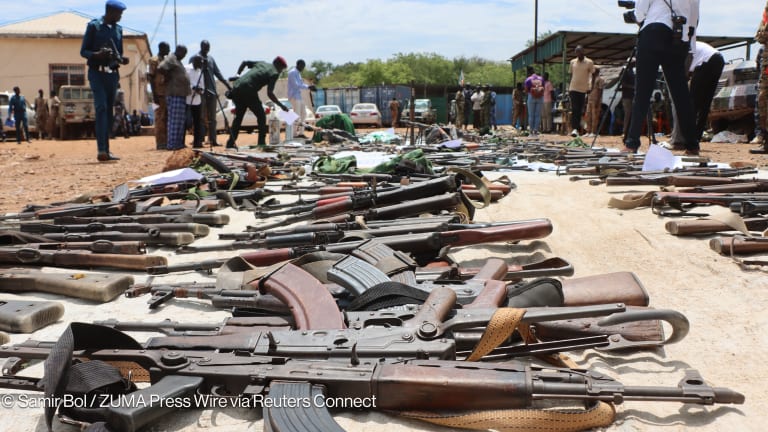
There is an “enormous” risk of Afghanistan's economy collapsing and the country faces a “dramatic humanitarian crisis,” according to United Nations Secretary-General António Guterres.
His warning came at an international summit organized by the U.N. to raise funds and draw attention to Afghanistan following the takeover by the Taliban. The country is now facing severe crises on multiple fronts, according to speakers at Monday’s summit. The U.N. Office for the Coordination of Humanitarian Affairs is seeking $606 million in a “flash appeal” to assist nearly 11 million people over the rest of the year.
International donors pledged more than $1 billion in humanitarian funding, but it was unclear on Monday how much of that figure was new financing going toward the U.N. flash appeal. The United Kingdom, for instance, repeated an aid pledge of £286 million ($396 million) made nearly a month ago.
UK to double aid to Afghanistan, but still giving less than 2019
An emergency debate convened to discuss the UK's response to the crisis in Afghanistan saw Prime Minister Boris Johnson announce that his government will push for a regional refugee response to be convened by the United Nations.
Meanwhile, other big donors fell short of expectations. The United States, whose rushed departure enabled the Taliban to take power in August, pledged less than $64 million in additional aid at Monday’s conference, though a statement from the U.S. Agency for International Development said the United States is providing nearly $330 million to the country this year.
Speaking to the U.S. House Foreign Affairs Committee, Secretary of State Antony Blinken insisted the aid money would not be run through the Taliban.
“Consistent with sanctions, this aid will not flow through the government, but rather through independent organizations like NGOs and U.N. agencies,” he said in his opening remarks at the hearing.
The problems with delivering aid in the country smoothly come amid worsening conditions inside Afghanistan.
“Even before the dramatic events of the last weeks, Afghans were experiencing one of the worst humanitarian crises in the world,” Guterres said, adding that hundreds of thousands of people had been forced to flee their homes. “The poverty rate is spiraling, and basic public services are close to collapse.”
The financial situation in the country — accompanied by a drought and food crisis — is causing mounting concern. Guterres told journalists of a “dramatic lack of cash.” He said: “Humanitarian aid will not solve the problem if the economy of Afghanistan collapses. The risk is enormous.”
Vicki Aken, Afghanistan director for the International Rescue Committee, called for “clear, intentional exemptions for humanitarian actors and humanitarian supplies from current and future sanctions regimes, including a focus on financial access” and “urgent and coordinated donor efforts to stave off the collapse of social services that would have a catastrophic effect on Afghans.”
While key Western donor governments have refused to recognize the Taliban, Guterres said engaging with them was necessary in order to supply assistance.
"It's impossible to provide humanitarian assistance inside Afghanistan without engaging with de facto authorities of the country. And I do believe it is very important to engage with the Taliban at the present moment for all aspects that concern the international community," Guterres said. It was in the “clear interest of the Taliban” to engage with the international community, and the group had shown an “attitude of support" for humanitarian work, he added.
Guterres said the U.N. had received two letters from the Taliban, voicing support for "full humanitarian work” and promising to ensure security, including escorts, for humanitarian projects.
While some projects have continued in Afghanistan despite the political turmoil, safe humanitarian access — for goods and aid workers — was a key practical concern raised by speakers.
“Humanitarians need to be able to deliver aid free from interference. We need a particular focus on the rights and safety of female aid workers,” said IRC’s Aken. She stressed that without female staffers, it would be “difficult and even impossible” for IRC’s response to reach women and girls.
The president of the International Committee of the Red Cross echoed the U.N. in warning that the entire region was at risk of instability but also insisted that aid should not be made dependent on the political path the country takes.
“Humanitarian action should not be conditioned to political, human rights or other stipulations. This is a dangerous pathway," Peter Maurer told the conference. “Primary health care is on the brink of collapse, water services failing, food prices exorbitant.”
“Even before the dramatic events of the last weeks, Afghans were experiencing one of the worst humanitarian crises in the world.”
— António Guterres, secretary-general, United NationsDeteriorating health care in the country was a key concern of Tedros Adhanom Ghebreyesus, director-general at the World Health Organization. Because of “holes in donor funding” to the WHO-founded Sehatmandi project supporting Afghanistan’s health care infrastructure, access to medical health is likely to “reduce sharply,” especially for women and girls, Tedros said.
He added that in the worst case, the drop in funding could lead to 90% of Sehatmandi-supported clinics closing. Tedros said falling health funding threatens the health gains made over the past 20 years, particularly for maternal and child mortality and polio eradication, with Afghanistan being one of the only countries where the wild poliovirus continues to exist.
Médecins Sans Frontières called on donors to “immediately lift the suspension of funds earmarked for healthcare in #Afghanistan,” adding that “Without these funds, what remains of the Afghan healthcare system will inevitably and rapidly collapse.”









